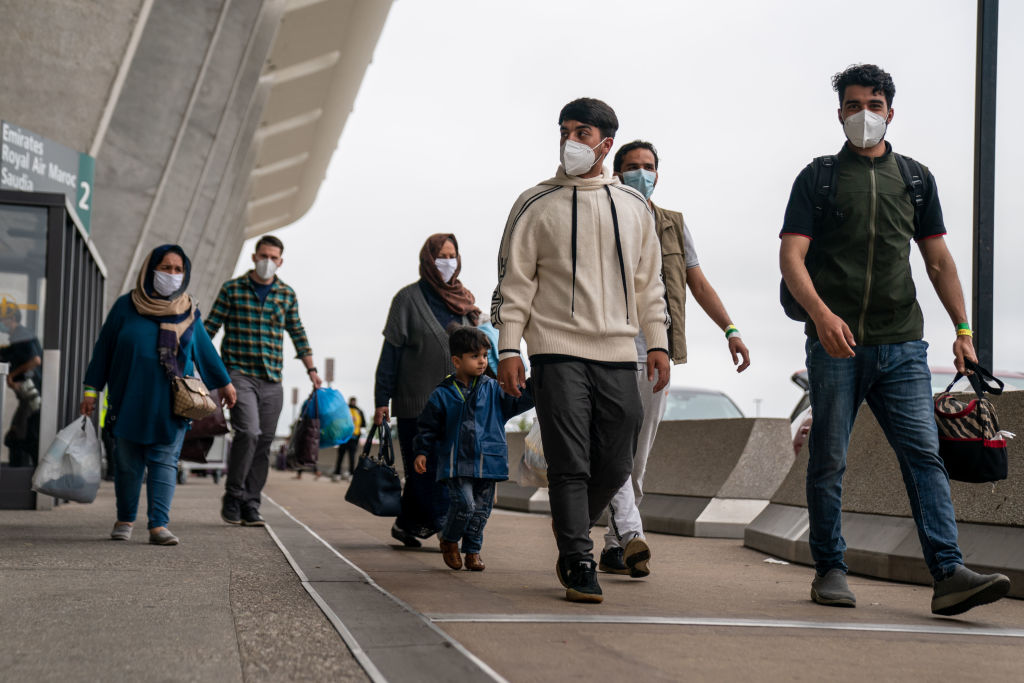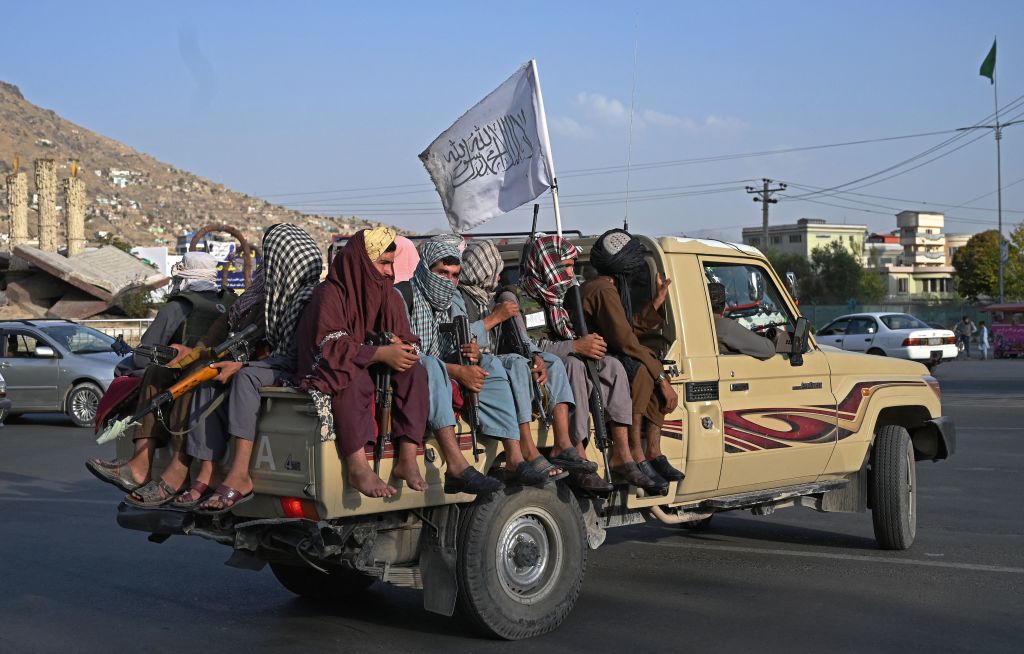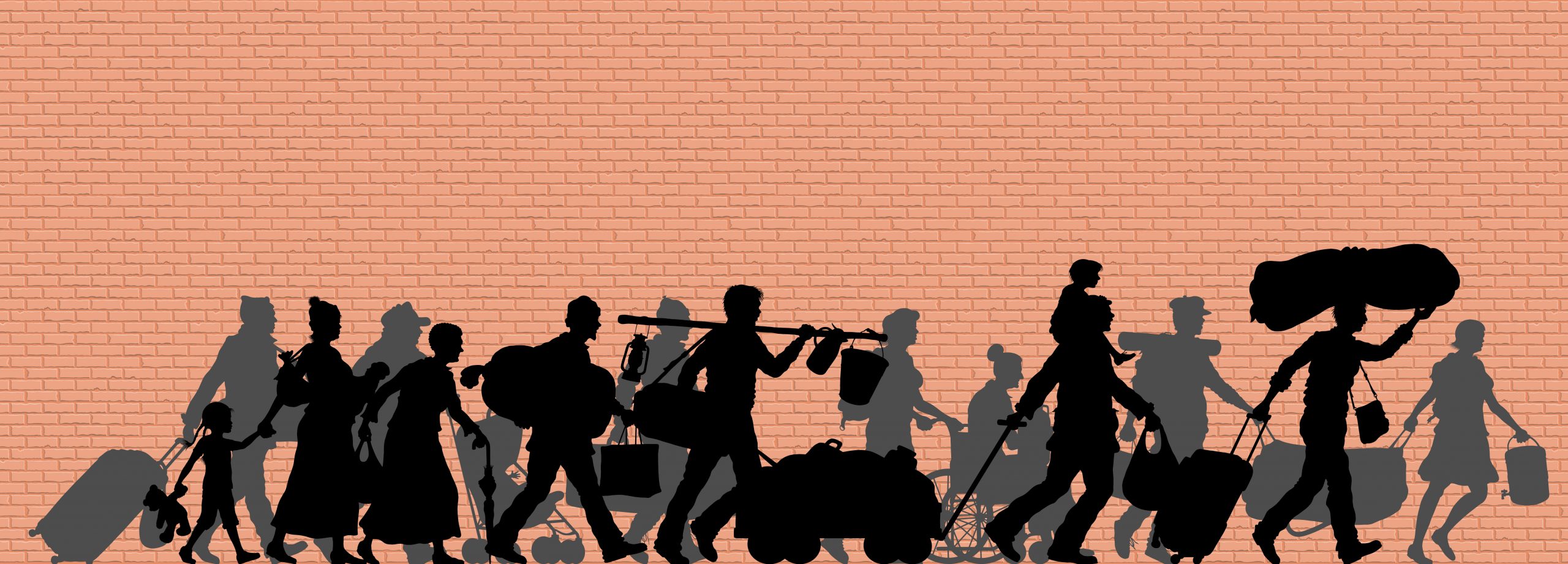None of the usual excuses serve to explain a major foreign policy disaster.
Importing Enemies

The demand to resettle Afghan refugees brings the war home.
Perennial Democratic White House aide, congressman, Chicago mayor, and ambassador-in-waiting Rahm Emmanuel’s sole memorable utterance—his only candidate for Bartlett’s—is his cynical 2008 maxim that the good guys (i.e., his team) must “never let a serious crisis go to waste.” He was speaking of using the financial crisis to usher in sweeping changes to law, policy, the economy, and society that would otherwise not have been possible through ordinary democratic processes.
The same logic applies now to the Democrats’—and many Republicans’—insistence that America be flooded with Afghan “refugees.” Importing as many immigrants as possible, from cultures as alien to traditional America as possible, is the ruling class’s top priority, after protecting its own wealth and power. But since importing millions upon millions of foreigners is the primary tool by which the ruling class maintains that wealth and power—by suppressing wage growth and dividing the population—it can be hard to disaggregate these two priorities.
The parallels between the two crises are obvious. Just as ruling class hubris, incompetence, dishonesty, and greed created the financial crisis, so did a similar combination produce the mess in Afghanistan. There is no need to rehash the “higher” motives for the failure here. It is worth noting, however, that lower motives were not absent: a lot of people were making a lot of money off that war.
And now, just like thirteen years ago, our rulers want to use a crisis they created as justification to ram through what they always wanted to do anyway. Which, in this case, is to resettle a hundred or two hundred thousand (the number varies depending on who’s speaking) foreigners with no tradition of liberty—who are indeed from a culture deeply alien, even hostile to, Western civilizational norms—in your communities.
The justification for this is already being trumpeted: we must save our “allies,” translators and such, who helped us throughout our twenty-year failed experiment. This argument, though offered in bad faith, is effective because the vast majority of American consider abandoning an ally to a deadly enemy dishonorable.
But does anyone really believe that America has, or ever had—even over the duration of two decades—200,000 “allies” in Afghanistan? That we ever employed even a fraction of that number as translators? The claim is risible on its face.
The regime has in any case already admitted that, of the roughly 111,600 Afghans (as compared to 5,400 American citizens) already evacuated, it has no idea who the vast majority of them are. Our masters tell us that we must save “allies” and “translators”—and then in the next breath admit that they’re indiscriminately taking anyone. People who act and speak this brazenly do so out of a deep reservoir of contempt and hatred. The message is “We can do and say whatever we want; we can lie and contradict ourselves within the same sentence, and there’s nothing you can do about it. In fact, if you object, or even notice, we will use our power to crush you.”
There surely are some translators or others who really did help American forces and who deserve to be evacuated. If Americans could trust their government to establish and operate a serious vetting system to identify those truly worthy of resettlement—vouched for, say, by two or more of our soldiers who worked directly with the applicant in the field—most would support refugee status for such people. But they would number at most in the thousands, not the hundreds of thousands currently in process of resettlement.
But Americans don’t trust their government to do any such thing, nor should we. We know full well that the state will lie to our faces about vetting, numbers, and everything else. We will end up getting, if the regime gets its way, people who’ve undergone little or no vetting, many of them military-aged males, many others soon to be, and still others who are active enemies. For another little detail the regime has been forced to admit is that America has already evacuated figures known to be on terror watch lists. This toxic combination of absent and incompetent vetting means we will end up importing thousands of people who pose a danger to our citizens and to our way of life.
Beyond those (few) genuine allies and translators, America has no obligation to bring over “refugees” at all. Those who claim such a reason on the basis of Colin Powell’s “Pottery Barn rule”—“you break it, you bought it,” a rule that Pottery Barn does not actually impose—are incoherent. For by this logic, the United States is perpetually bound to compound its worst disasters with further deliberate errors: wreck a country, import its citizens. Or is that simply the plan?
Instead of “you break it, you bought it,” how about, “when you’re in a hole, stop digging”? Why do 2,500 American deaths, 20,000 injuries, and $2 trillion in losses obligate us to take on additional problems and burdens? How do our genuine obligations to a few hundred translators extend across an entire population of more than 37 million? Such arguments are a combination of sophistry and guilt-trip, in the service of ruling class pieties and political (and pecuniary) interests.
It’s far from self-evident that the war made Afghanistan worse. This was not like the wholesale destruction of Germany and Japan—industrialized countries with first-world infrastructure, leveled almost to the bare ground. Afghanistan was a premodern throwback before we got there and remains one today. If anything, much of that $2 trillion built far more than our drones and JDAMs destroyed. But according to one (if the only one) of the standards our ruling class set for itself—better, more modern schools, hospitals and other facilities—Afghanistan is today better off than it was in 2001. So whence arises this alleged obligation to resettle Afghans in America?
As for the Afghans killed in the war, many—likely most—were enemies. Or would those arguing for refugees now deny that? Doing so bolsters their pro-refugee argument—we busted their country so we owe them!—but eviscerates their pro-war argument. You mean we weren’t over there killing dangerous terrorists after all? Yes, there was collateral damage. But let those aforementioned 2,500 American deaths, 20,000 injuries and $2 trillion stand as compensation.
In contrast to all this, there are many, and compelling, reasons not to take in Afghan refugees.
First and foremost, America has massive problems here at home. Ours is not the competent, confident, prosperous country of the mid-twentieth century, with its patriotic and capable leadership. We are instead a decaying, half-broken society littered with dying communities, withering industries, and neglected, even despised, citizens. America very badly needs to get its own house in order—and fast. Our priorities should be to secure our borders, rebuild our industrial base, combat “deaths of despair” by giving ordinary people reason to hope, reform our increasingly anti-white education system, de-financialize the economy, and much else. With so many urgent problems to address at home, we don’t have the capacity to absorb hundreds of thousands of refugees—especially with the ongoing crisis at our southern border. We need to serve the interests of American citizens first.
Second, cultural compatibility matters. A 2013 Pew survey (i.e., conducted 12 years into our attempt to “democratize” Afghanistan) found that 99 percent of Afghans want sharia to be the law of their land. Sharia is about as far from American constitutionalism and law as you can get. We couldn’t make Afghans into liberal democrats over there; what makes us think we can do it here?
If there must be resettlement of those Afghans at genuine risk, but who contributed nothing to our war effort, they should be resettled in the most time-honored and logical fashion. I.e., they should go to countries closest to Afghanistan, where culture, language and customs are most similar, and from which it will be easiest for them to return home when conditions permit.
Third, a 2017 article by Cheryl Benard, the wife of a former U.S. ambassador to Afghanistan—a man himself Afghan-born—detailed how Afghan refugees have the worst crime and public assistance rates of all refugee groups in Europe. She admitted the article was painful to write but argued that the truth needed to be known. Why would we willingly, knowingly import more crime and poverty? Don’t we have plenty of both already?
A related, and disturbing, point: a great many American servicemembers deployed to Afghanistan observed how frequently Afghans, including many of our so-called “allies,” sexually abused Afghan boys, in many cases on American bases. Those Americans who complained or even pointed it out were ordered by their superiors to look the other way because “that’s their culture.”
You may shake your head at this example of relativism run amok. But we both know full well that the regime will couple—already is coupling—“that’s their culture” with furious accusations of “racism” against anyone who dares point out the problem. “They don’t do that, you bigot, and it’s fine that they do.”
To ask an indelicate but necessary question: among the 111,600 unvetted Afghans we’ve evacuated so far, how many are pederasts? Our government has no idea and doesn’t seem to care. But it cares if you care. If you do, it knows you are a “racist.” One vile, hatemongering (Republican) Congressman even says your concerns about Afghan refugees make you “evil.”
Here is the most important paragraph from Benard’s article:
This brings us to a third, more compelling and quite disturbing theory—the one that my Afghan friend, the court translator, puts forward. On the basis of his hundreds of interactions with these young men in his professional capacity over the past several years, he believes to have discovered that they are motivated by a deep and abiding contempt for Western civilization. To them, Europeans are the enemy, and their women are legitimate spoils, as are all the other things one can take from them: housing, money, passports. Their laws don’t matter, their culture is uninteresting and, ultimately, their civilization is going to fall anyway to the horde of which one is the spearhead. No need to assimilate, or work hard, or try to build a decent life here for yourself—these Europeans are too soft to seriously punish you for a transgression, and their days are numbered.
Since Obama’s second term at least, and intensifying in the wake of the George Floyd riots, American officialdom has been passionately committed to leniency—for certain groups. Government at nearly all levels seems uninterested in, or even in favor of, lawbreaking not committed by white men. Many prominent voices in society now say openly that other, less “privileged” demographics cannot be responsible for any harm they do because its sole cause is their “oppression.”
Hence how hard is it to imagine some of our resettled Afghan “allies” committing, on our soil, against our kids, the same sorts of atrocities they take as their birthright in their homeland? Should we then expect punishment from American officials who cannot bring themselves to admit that a sainted refugee of another race and faith could possibly be responsible for his actions? But we can be sure of one thing: if an outraged father snaps and takes the law into his own hands, the state will crush him like a bug, instantly.
Mass resettlement of Afghans would thus seem to be a recipe for social chaos and unrest greater than any America has yet experienced—precisely at a time when we’re already experiencing the most since the 1960s. Who would choose this for their own country? We can be forgiven for assuming that our rulers are intentionally trying to hurt us.
Indeed, I don’t think that possibility can be altogether ruled out. Shortly after the Afghan withdrawal debacle became impossible for even the most brazenly dishonest regime hack to deny or spin, one of them shifted tactics: “Afghanistan,” he thundered, “is your fault.” By “your,” he meant ours—yours and mine, the American people’s.
The ruling class is angry that the people demanded an end to their idiotic, life-wasting failed experiment. They’re embarrassed at having been exposed as fools and failures. Some are bitter that the war-profiteering gravy train that kept them so well-fed for so long has come to an abrupt and ignominious end.
Instead of taking stock and asking themselves tough, necessary questions, they’re lashing out. They want to punish us for our justified doubts and lack of enthusiasm. They want to deflect blame for their own failure. They know, or should, that taking in refugees from a very poor, very tribal, very backward, very extremist society is a recipe for disaster. But they also know that none of these “refugees,” you can bet, will be settled in Cambridge, or the Vineyard, or the Upper West Side, or Georgetown, or Chevy Chase or McLean, or Berkeley or Palo Alto, or Santa Monica or Silverlake.
No, they’ll be going to heartland communities where what’s left of the middle class lives, to put stress on local schools, hospitals, police departments and other social services. And allowed to live as they damned-well please, free of the laws and regulations that tie honest citizens in knots, that are only enforced against us.
It’s hard not to conclude that our government hates us. That conclusion, at any rate, fits the observable facts of its actual behavior.
The American Mind presents a range of perspectives. Views are writers’ own and do not necessarily represent those of The Claremont Institute.
The American Mind is a publication of the Claremont Institute, a non-profit 501(c)(3) organization, dedicated to restoring the principles of the American Founding to their rightful, preeminent authority in our national life. Interested in supporting our work? Gifts to the Claremont Institute are tax-deductible.
Our ruling classes reject our right to govern ourselves.
Donor dollars shouldn’t be made in China.



